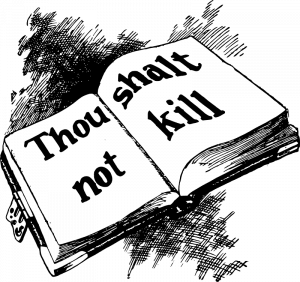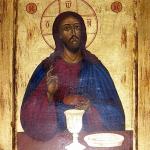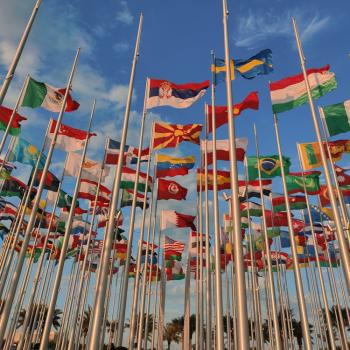
Thou shalt not kill (cf. Ex. 20:13). We are told we must respect life, because life is a gift, life is holy, for life comes from God. The Holy Spirit is the Lord and giver of life – those who disrespect life, disrespect the Spirit of Life. Those who recognize it is holy see and discern the holiness of God behind it. Life is to be treasured. We must not kill. We must not seek to destroy life.
“But,” some might say, “We should interpret or translate that verse by rendering it as, ‘Do not murder.’”
What does that objection mean? What is murder? Is it any premeditative killing not sanctioned by the state? But then whatever killing the state approves would not be murder. State-approved genocide, indiscriminate killing of innocent civilians by governmental authorities in order to manipulate and control the population, would be seen as acceptable. Life itself would not be seen as sacred, rather, governmental power and authority would be, for it would be that authority which would determine which life should be preserved and which life could be or should be eliminated.
The point of the command is that we should not unjustly kill others. All life is holy. Any preventable and willful killing of others is unjust. This is why, if some death is outside of our control, we are not responsible for such death and so do not suffer condemnation. Willfully being involved in activities which lead to the unnecessary death of others, even if the death is indirectly related to our action or inaction, is what we must avoid. All such death is unjust, and so, against the greater, transcendent law of God, the law which looks for and seek to preserve life due to its sacred nature. It is in this greater law that we find such death is not sanctioned, and so, even if a particular state allows it and promotes it, it is still “murder.” This is why it does not matter if we translate the verse from Exodus as “do not kill” or “do not murder,” because we must recognize that it is the higher law of God which determines what is lawful or not, and all killing of others is unlawful and so “murder.”
The Christian tradition has long recognized that killing is to be rejected; it never wondered whether or not God meant “killing” or “murder,” but saw them as being equivocal in this context. This is why, when various saints and moral theologians reflected upon the commandment, their words indicate how and why we must view it as a rejection of homicide in general. St. John of Kronstadt, in his contemplations, considered various ways, beyond those which are obvious, in which we can and should be condemned for murder:
“Thou shalt do no murder.” Amongst others, doctors murder by their ignorance of the sick man’s illness when they prescribe him injurious medicine. Those also commit murder who will not have a doctor to attend them or another person who is ill and requires the doctor’s help. Those commit murder who irritate a sick man to whom any irritation may be fatal — for instance, a consumptive person – and thus hasten to his death. Those commit murder who, through avarice or any other bad reason, delay in affording the doctor’s help to a sick person, or in giving bread to the hungry. [1]
Now, it seems harsh for St. John of Kronstadt to suggest that doctors who give the wrong medicine to their patients can be classified as murderers, because doctors are not omniscient and can make mistakes. He does not seem to dispute that fact. Rather, he is addressing those who are willfully ignorant, that is, those who commit malpractice which leads to the death of their patient. The doctor who shrugs off their duty, the doctor who does not take the time to try to properly discern the medical condition of their patient, is the doctor he is concerned about, for clearly, doctors are not omniscient, and they can make mistakes. Thus, he is not against the work of doctors; he does not want to place an undue burden on them, condemning them for things which are truly outside of their control. Thus, he is also clear, doctors are important, and people should seek them out when needed, which is why he said that those who needlessly prevent others from attaining such medical care likewise are designated as murderers. When health insurance companies do not approve needed cancer treatment, for example, and a patient dies of cancer which could have been treated, they are guilty of murder because their willful negligence needlessly led to that person’s death. Likewise, those who promote a medical system in which medical needs of the poor and needy are not met because they are impoverished and cannot afford such aid are cooperating with and promoting murder as well. Health care is a right, not a privilege, because life is a right not a privilege. Food, similarly, is a necessity to life, and those who would let hungry people starve to death, those who promote economic systems which lead to such death, fail to support and promote the dignity of life and must be confronted with the murder, the needless, unjust deaths, which they promote.
It is important to remember, we sin not only by what we do, but by what we fail to do. When something is outside our power, we are not culpable. Thus, because doctors are not omniscient, and we, ourselves, are limited in our own resources and means to helping others, we must realize the limits of our culpability. What is important is that do what we can, whatever it is which we can do, even if it is to speak out against an unjust system which allows for others to needlessly die. Such a system, and the systematic structure of sin which lies behind it, must be overcome. Health care should be available for all. Food, shelter, clothing, should be available for all. It is possible to fulfill these expectations. The resources are there, hoarded up by the rich. It is not an issue of “socialism” vs. capitalism, it is an issue of life and death, and whether or not we stand for life or death.
We must preserve life, and we must root out all the vices which would lead us to shrug off the needless deaths of others. If we worship God, we must know he wants us to love our neighbor as ourselves; if we neglect this greater law, our worship is in vain. How can we go to liturgy with such indifference and believe ourselves to be holy? How can we, during a pandemic, think lightly of those suffering from it, indeed, thinking that those who get it are weak and disposable and so not our concern? St. Johnn of Kronstadt, once again, warns us against such malice:
One meets with distorted hearts in some men. At the celebration of the sacraments they breathe unbelief and insensibility, moral impotency or mockery, disturbance, and diabolical fear! During the illness of those near to them one is also struct by their insensibility and even diabolical malignancy. They consider their sick brother as superfluous in the world, and inwardly think, “There will be more room for me if he dies,” not reflecting that every man – and they themselves – may perhaps die to-morrow, and not pitying the sufferer in their hearts as their own member. [2]
Being indifferent to the plight of others, being indifferent to their potential death through our actions or inactions, therefore, violates the moral law. To think of economics instead of life is not pro-life. To ignore the dangers associated with our actions, not just to ourselves, but others, is not pro-life. To be pro-life is not just a matter of legality, it is an issue of having a compassionate heart, seeking the good of our neighbor so that their life can be dignified. “The principle of not killing or harming should not be considered as something in itself but as the servant of compassion and subordinate to it. Therefore, it must come to terms with reality in practical fashion.”[3] We must be practical, and realize what we can and cannot do; we must work for what we can do, and stop trying to promote what is impossible and use the impossible to ignore what is possible. Ideology does not know practicality, and so becomes a legalism which leads to death, while compassion and the love which underlies it acts beyond legalism, as it looks for what is possible and does it. Justice demands just action, not ideology – we must not let our neighbor unjustly die when it is possible to save them. Ideology leads to murder, because of its inflexible promotion of its own rules over the good, becoming, therefore, the enemy of justice. The sick and the poor need justice, not ideology; they need people willing to engage the system, to act in practicality, while working to change the system – those who ridicule such practicality are the ones who, in the end, help the system remain cruel and indifferent, so that even if they are able to change the system, they will create rules and be inflexible, leading them to likewise be unable to deal with those practical concerns which are not answered by their ideology. Even if their ideals are right, their ideology is not, as it will lead to the death of those cannot be saved by their rules. We truly must be pro-life, and that means, we must support people over ideology, doing what we can for them instead of justifying our neglect through the rules of our ideology. We must always strive for what is better, never letting the perfect, some ideological rule which we hold onto, being the enemy of the good, that is, of our real moral duty.
[1] St John of Kronstadt, My Life in Christ. Trans. E.E. Goulaeff (London: Cassel and Company, Ltd., 1897; repr. Jordanville, NY: Holy Trinity Monastery, 2000), 140.
[2] St John of Kronstadt, My Life in Christ, 140.
[3] Albert Schweitzer, The Animal World of Albert Schweitzer. Trans. and ed. Charles R. Joy (Boston: Beacon Press, 1950), 146.
Stay in touch! Like A Little Bit of Nothing on Facebook.
If you liked what you read, please consider sharing it with your friends and family!












